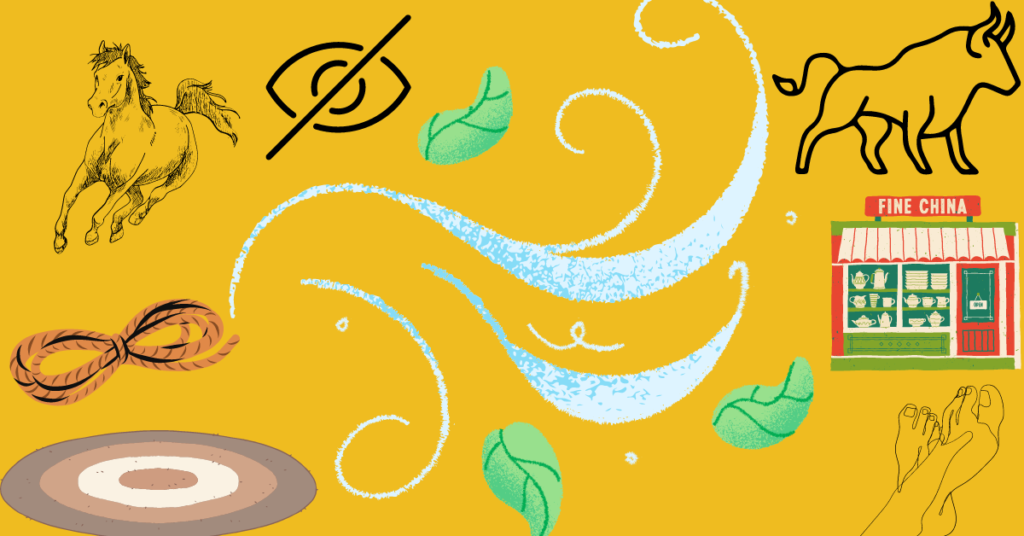
Exercise 1: Vocabulary
1. Fit to be tied
Definition: Extremely angry or agitated.
Example: “When she discovered her car had been towed, she was fit to be tied.”
2. Turn a blind eye
Definition: To deliberately ignore or pretend not to notice something.
Example: “The teacher turned a blind eye when the students were quietly using their phones during the lecture.”
3. Hold your horses
Definition: To wait or be patient.
Example: “Hold your horses! Let’s make sure everyone is ready before we start the meeting.”
4. Like a bull in a china shop
Definition: To be clumsy or reckless in delicate situations.
Example: “He barged into the meeting, knocking over the projector—like a bull in a china shop.”
5. Sweep something under the rug
Definition: To hide or conceal a problem or issue instead of dealing with it.
Example: “The company decided to sweep the financial irregularities under the rug instead of addressing them openly.”
6. Get cold feet
Definition: To become nervous or hesitant about something one was initially enthusiastic about.
Example: “He was excited about skydiving, but as the plane took off, he got cold feet and decided not to jump.”
7. Throw caution to the wind
Definition: To take a risk without worrying about the consequences.
Example: “She decided to throw caution to the wind and quit her job to pursue her passion.”
8. Put the cart before the horse
Definition: To do things in the wrong order or with incorrect priorities.
Example: “You’re putting the cart before the horse by planning the party before even inviting guests.”
Exercise 2: Dialogue
Mark: Hey, Sarah, have you seen Dave today? I heard he had an argument with his boss this morning.
Sarah: Yes, I ran into him in the break room. He was fit to be tied when he told me about it. He felt his boss was being unreasonable.
Mark: I can imagine. Dave is usually calm, so it must have been serious. By the way, did you hear about the new policy at work?
Sarah: Yeah, I did. They decided to turn a blind eye to employees working from home occasionally. It’s a nice change.
Mark: It certainly is. Now, if only they would hold their horses and improve the cafeteria food. It’s been terrible lately.
Sarah: I know what you mean, Mark. Sometimes, it feels like they hired a chef who’s like a bull in a china shop in the kitchen.
Mark: Absolutely! And speaking of issues, did you hear about the budget problems in our department?
Sarah: Yes, but it seems like they want to sweep it under the rug rather than addressing the root causes.
Mark: That’s concerning. We shouldn’t throw caution to the wind when it comes to financial matters.
Sarah: You’re right, Mark. We should encourage a more transparent approach. And, by the way, are you still planning that big trip?
Mark: I was, but I’ve got cold feet about it recently. It’s a lot of money, and I’m not sure if it’s the right time.
Sarah: I understand, Mark. Maybe it’s better to put the cart before the horse and save up before taking such a big trip.
Mark: That’s a sensible idea, Sarah. I’ll reconsider my plans. Thanks for the advice.
Exercise 3: Fill in the blanks
Lisa: Hey, Mark, have you seen Tom today? He was supposed to present his project to the team this morning.
Mark: Yeah, I saw him earlier. He was ______________ when I asked about the project. Apparently, he lost all his data last night.
Lisa: Oh no, that’s terrible! I can’t imagine how he feels. By the way, did you notice that the supervisor ______________ when Tom’s laptop crashed?
Mark: Yes, I did. It was strange because the supervisor usually pays close attention to the presentations. It was as if she decided to ______________.
Lisa: That is strange. Maybe she was preoccupied with something else. Anyway, we should ______________ and wait for Tom to resolve his issue before the presentation.
Mark: Agreed, Lisa. Rushing him would be like ______________ in this situation. Let’s give him the time he needs.
Lisa: Absolutely, Mark. And speaking of rushing, I heard you’re planning to propose to Sarah soon. Is that true?
Mark: Well, yes, I’ve been thinking about it, but I’m starting to ______________. It’s a big step, and I want everything to be perfect.
Lisa: It’s natural to feel that way, Mark. Just remember not to ______________. Take your time and plan it thoughtfully.
Mark: Thanks, Lisa. I appreciate your advice. I want it to be a memorable moment for both of us.
Options:
1. fit to be tied
2. turned a blind eye
3. hold your horses
4. like a bull in a china shop
5. swept something under the rug
6. throw caution to the wind
7. put the cart before the horse
8. get cold feet
Exercise 4: Discussion
- Create examples using the idioms above.
- If that is too easy, challenge yourself and create a dialogue with each idiom!
- Discuss which idioms you found interesting.
- Are any of the idioms similar or different compared to idioms in your language?
- Discuss where you think each idiom got its meaning